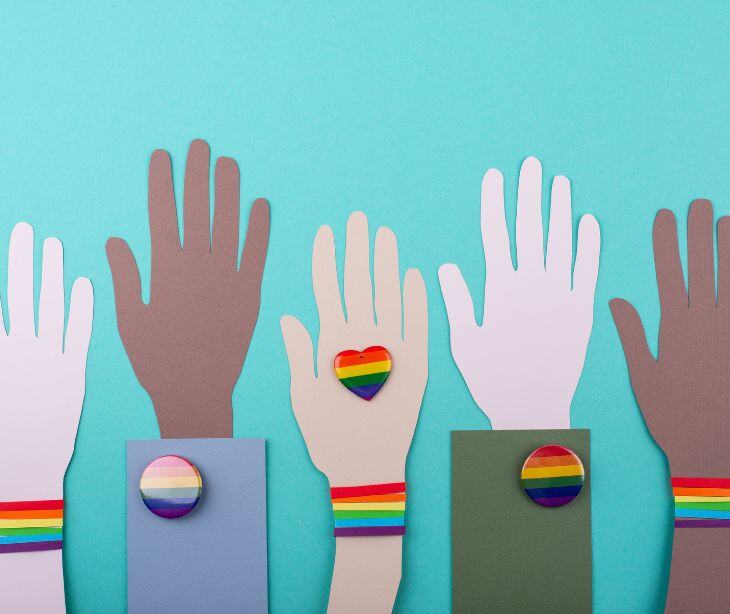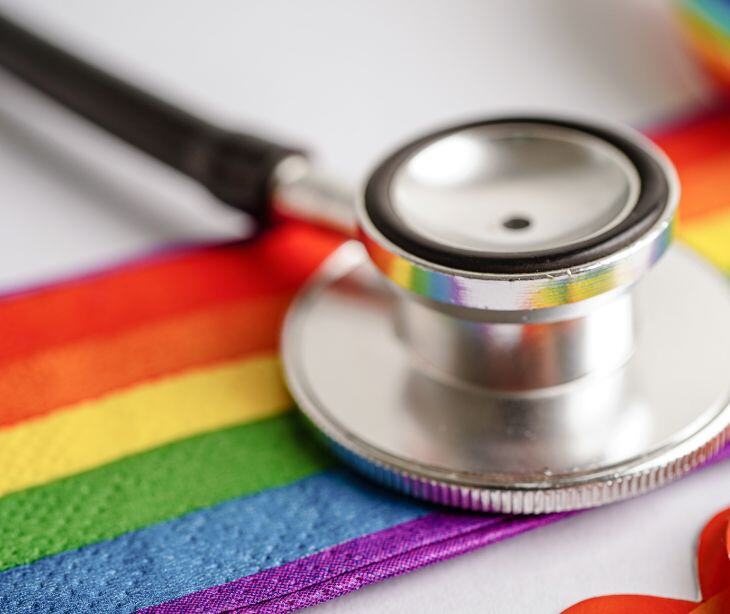5 min read
Enhance LGBTQ+ healthcare with HIPAA compliant emails this Pride Month
Caitlin Anthoney June 07, 2024

As we celebrate Pride Month, providers can use HIPAA compliant emails to help increase LGBTQ+ awareness, promote inclusivity, and ensure patient-centered care.
Understanding Pride Month
“Lesbian, Gay, Bisexual, Transgender and Queer (LGBTQ) Pride Month is currently celebrated each year in the month of June to honor the 1969 Stonewall Uprising in Manhattan. The Stonewall Uprising was a tipping point for the Gay Liberation Movement in the United States,” explains the Library of Congress.
While Pride Month is a celebration, there are still ongoing issues that need to be addressed to ensure equitable and inclusive healthcare for LGBTQ+ individuals. Healthcare organizations must enhance support and recognition of LGBTQ+ needs for a more inclusive and aware environment.
“Pride month has a couple of important pieces to it. One of the pieces is just increasing overall awareness as well as representation, advocacy in both national and local communities that increase support, knowledge, and action towards positive change," explains Jami Dumler, a licensed clinical social worker and regional director of Thriveworks.
Recognizing LGBTQ+ individuals and their needs
According to a study on the healthcare needs of LGBTI people, they “constantly face challenges and disadvantages in the healthcare system that prevent them from getting the best possible patient-centered care.” So, providers must understand and address their needs for equitable healthcare.
Director/CEO of Central Alabama Veterans Health Care System states “Healthcare executives, should all be involved is because creating an inclusive healthcare environment doesn’t just take care of our LGBTQ+ patient population, it takes care of all of us. We all have many facets to our lives and, as Thomas Jefferson and many others have stated in their own way, the measure of society is how it treats its most vulnerable members. As healthcare leaders, we are responsible for all of our patients, especially our most vulnerable.”
Ultimately, an inclusive healthcare environment improves the quality of care for LGBTQ+ patients and creates a more compassionate and equitable system for everyone.
Go deeper: How patient-centered communication improves patient outcomes
HIPAA compliance protects the LQBTQ+
HIPAA compliance ensures the confidentiality and security of patient information, particularly for marginalized communities like the LGBTQ+ population. Human Rights Campaign states that “HIPAA should not be used as an excuse to deny rights to LGBTQ+ patients.”
HIPAA compliant platforms, like Paubox, offer advanced security measures like encryption, two-factor authentication, and access controls to safeguard sensitive information about sexual orientation, gender identity, and related health concerns. These platforms allow providers to share information and resources to support LGBTQ+ patients while safeguarding their protected health information (PHI).
More specifically, providers must use HIPAA compliant emails to communicate with LGBTQ+ patients and ensure their healthcare needs are met with sensitivity and respect. Ultimately, providing a safe space for individuals to seek care without breach of confidentiality.
Read also: Using emails for LGBTQIA+ mental health support
Using HIPAA compliant emails for LGBTQ+ awareness
Depathologization
According to the earlier study, LGBTI people need “authenticity and openness e.g., concerning a lack of knowledge, issues of coming-out, and mental stress, and a wish for the depathologization and elimination of ignorance of LGBTI concerns,” during diagnosis, treatment, and counseling.
Provider organizations can use HIPAA compliant emails to share educational resources and guidelines on depathologizing LGBTQ+ identities, encouraging staff to recognize and affirm sexual orientations, gender identities, and expressions as natural variations of human diversity, rather than viewing them as mental illnesses or disorders.
Visibility
The study found that “bisexual people, on the one hand, rarely make themselves visible in health care and, on the other hand, no visible bisexual friendly health care services [were] offered. This indicates a great need for health care professionals with persistent awareness, an open attitude, and specific knowledge, which are factors that are associated with quality care…”
Provider organizations can help address this issue by sending HIPAA compliant promoting initiatives like placing rainbow stickers on door labels or other visible markers that signify LGBTQ+-friendly spaces.
Cancer prevention programs
According to the study, “There is evidence that LGBTI people are at increased risk for certain cancers and that screening programs do not sufficiently reach this population.”
HIPAA compliant emails can help ensure that LGBTQ+ individuals are included in cancer prevention efforts. For example, providers can send mandatory invitations to cancer screenings tailored to LGBTQ+ needs, preventing anyone from being overlooked due to their sexual orientation or gender identity.
Using HIPAA compliant emails to promote inclusive language
Communication training
Provider organizations can use HIPAA compliant emails to send information on gender-sensitive and inclusive language use to help providers communicate more effectively with LGBTQ+ patients. Additionally, HIPAA compliant emails can include tips, best practices, and reminders about using correct pronouns and respectful language.
Training announcements
HIPAA compliant emails can notify staff about upcoming training sessions focused on LGBTQ+ competence, ensuring everyone can participate in ongoing education.
LGBTQ+-competent counseling
Provider organizations can use HIPAA compliant emails to notify providers and patients about available LGBTQ+-competent counseling and psychosocial care services. Additionally, HIPAA compliant emails can include updates about new services or changes to existing ones, helping providers make appropriate referrals.
Using HIPAA compliant emails for provider education
Educational materials
Provider organizations can send educational materials on topics like STI transmission, mental health risks, and the health needs of transgender and intersex clients to ensure providers are informed on LGBTQ+ health needs.
Updates on best practices
Regular emails can keep healthcare professionals informed about the latest research and best practices in LGBTQ+ healthcare, helping them stay current and provide the best possible care.
Promoting specialized services for LGBTQ+ individuals
Transgender health services
Providers can use HIPAA compliant emails to inform transgender patients about available treatments like hormone replacement therapy (HRT), sending them updates, appointment reminders, and monitoring guidelines. HIPAA compliant emails can also include information about gender-affirming surgical options and post-surgical care to help ensure patients are well-informed and supported.
Mental health and counseling services
Providers can use HIPAA compliant emails to refer patients to trained LGBTQ+ therapists who provide affirmative therapy so patients know where to find supportive mental health care. Additionally, provider organizations can send announcements about LGBTQ+ support groups and crisis intervention services.
LGBTQ+-specific medical care
Clinics specializing in HIV/AIDS management can use HIPAA compliant emails to share prevention tips, treatment options, and appointment reminders. They can also use HIPAA compliant emails to promote sexual health services, like STI testing and treatment, safe sex education, and vaccinations.
Additionally, fertility clinics can use HIPAA compliant emails to share information on reproductive health services tailored to LGBTQ+ individuals, informing patients of options like fertility preservation and surrogacy services.
Youth and family services
HIPAA compliant emails can promote safe spaces with mentorship, education, and social activities for LGBTQ+ youth. Providers can also use HIPAA compliant emails to inform families about counseling services to help them support their LGBTQ+ loved ones.
Community health services
HIPAA compliant emails can be tailored to assist LGBTQ+ individuals in navigating the healthcare system, finding LGBTQ+-friendly providers, and understanding insurance coverage. Additionally, providers can use HIPAA compliant emails to refer patients to legal and advocacy services that can help them change their name and gender on official documents.
Elder care services
Providers can use HIPAA compliant emails to send elderly patients information about inclusive long-term care facilities and services tailored to aging LGBTQ+ individuals.
LGBTQ+ health research and education
Providers can use HIPAA compliant emails to collaborate with researchers, promoting initiatives on LGBTQ+ health issues. Ultimately, HIPAA compliant emails can help providers contribute to advancing research and improving healthcare outcomes for LGBTQ+ individuals.
FAQs
How does HIPAA compliance contribute to LGBTQ+ inclusivity in healthcare?
HIPAA compliance protects the sensitive health information of LGBTQ+ individuals and promotes trust between patients and providers.
Can healthcare providers disclose a patient's LGBTQ+ status without permission?
No, disclosing a patient's LGBTQ+ status without their consent violates HIPAA regulations and their right to privacy.
Do HIPAA compliant emails protect patient privacy?
Yes, HIPAA compliant emails encrypt patients’ protected health information (PHI) to prevent unauthorized access or data breaches. Additionally, access controls and authentication measures ensure that only authorized individuals can view or access PHI.
Subscribe to Paubox Weekly
Every Friday we'll bring you the most important news from Paubox. Our aim is to make you smarter, faster.



